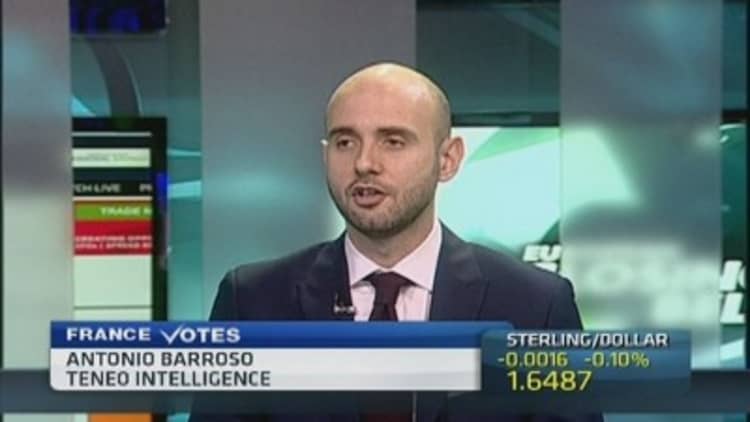
On Sunday, millions of French people will go to the polls for the first round of town hall elections, a vote that could punish the ruling socialist party and prompt President Francois Hollande to reshuffle his cabinet in a bid for popularity.
Hollande's government, headed by prime minister Jean-Marc Ayrault, is in a weak position. The president's record low popularity rating, at 25 percent in the latest LH2/Nouvel Observateur poll released on March 18, is only surpassed by his chief of government, whose approval rating stands at 23 percent.
(Read more: French unemployment dips – along with confidence)
Drawing national conclusions from the outcome of the local elections for mayors in France's cities and towns is something Hollande will not want his rivals to do, despite having done just that in 2008.
Back then Hollande was the leader of the opposition and Nicolas Sarkozy, in office for just 10 months, had been powerless in the face of a so-called "a pink wave" - pink being the Socialist Party (PS) color-and stop a whole host of cities from falling into PS hands.
"The national significance of the vote", Hollande wrote at the time "concerns the President, the government and the majority." He added that a President had rarely faced such a backlash after 10 months in office.
Will these words come back to haunt him?
A March 15 poll by LH2/France Bleu revealed that only 9 percent will vote with the government's track record in mind. Some 11 percent will vote with the country's economic and social situation in mind and the vast majority, 70 percent, will vote with local issues in mind.
Furthermore, in a separate LH2 survey released on March 17, 79 percent of French people said recent political scandals would not affect their vote. The opposition UMP party will have breathed a sigh of relief at this finding; the party has been rocked by two scandals in recent week. They include the secret recording of some of former president Nicolas Sarkozy's meetings and claims of favoritism by the party's new leader who allowed a communication firm owned by close friends to overcharge the party.
Low turnout, right-wing gains
Low voter turnout could damage Hollande's socialists however.
Antonio Barroso, senior vice president at political risk analysis firm Teneo Intelligence told CNBC via phone that "abstention tends to be higher amongst young left-wing voters than amongst right-wing voters."
According to Barroso, the UMP should win with about 30 percent of the vote, followed by the PS at around 21 percent and then, in a real show of power, the far-right National Front (FN) with 17 percent.
Douglas Webber, professor of political sciences at the INSEAD Business School told CNBC that the PS is "bound to do worse than last time, but it won't do as badly as you might expect given the impopularity of Hollande and his government."
But the FN could actually do better, Barroso explains as "there is a lot of hidden vote. People say they won't vote for them but actually they do."
Webber also expects the far-right party to "do very well indeed", by winning local governments in its strongholds - the old industrial northern France and the south east
(Read more: Hollande meets Obama for a...tea party?)
Round two
If no clear winner emerge from the first round, candidates with at least 10 percent of the votes will move on to a second round. In such a scenario, just three or four candidates could compete for their town halls. The right-wing FN could then scupper the UMP's chances, with its voters unlikely to back the more moderate UMP.

The FN's "major impact" Webber said, "will be to divide the right-wing vote and prevent the UMP from winning as many local governments as they could have."
"Some FN voters might support the UMP, but some may stay at home for the second round. It shouldn't be taken for granted that they will vote UMP."
"At this point", Barroso concludes, "it benefits the socialist party, because fragmentation is more severe in the right-wing than in the left-wing space."
Paris' first female mayor?
Socialist candidate Anne Hidalgo is most likely to win the vote in Paris, ahead of the center-right's Nathalie Kosciusko-Morizet.
If elected, she will become Paris' first female mayor, after being first deputy mayor to Bertrand Delonoe for the past six years. She campaigned heavily for more housing, promising the construction of 10,000 new homes a year and better quality of life with better, greener transport to cut back chronic pollution in the city. Finally, she promised the capital a 8.5 billion euros ($11.7 billion) investment program.
But whatever the outcome, Hollande is widely expected to announce a cabinet reshuffle. And the harsher the vote for the PS, the bigger the reshuffle could be, starting with a replacement at the very top.
Jean-Marc Ayrault, the country's prime minister will retain his post if damage is limited, say both Webber and Barroso, but if the party's losses are deeper than anticipated, he could be replaced. The top contenders appear to be Laurent Fabius (currently foreign affairs minister) and Manuel Valls (currently interior minister).
The finance ministry could also see a reshuffle. "Rumors say Moscovici could go to Brussels", Barroso said, to become a member of the next European Commission. The current commission's mandate is coming to an end in October, and a new President and cabinet will take over from November 2014.
This could potentially be a risky move as the country's economy remains fragile. While France beat expectations with growth of 0.3 percent in the fourth quarter of 2013, unemployment still stood at 10.2 percent in the last quarter of 2013.
(Read more: Hollande hires gangster rap expert to write speeches)
Follow us on Twitter: @CNBCWorld


